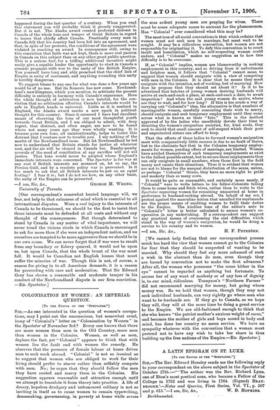COLONISATION BY WOMEN AN IMPERIAL QUESTION.
[To THE EDITOR OF THE "SPECTATOR-1 Sin,—As one interested in the question of women's occupa- tions, may I point out the unconscious, but somewhat cruel, irony of " Colonial's " letter on " Colonisation by Women" in the Spectator of November 3rd ? Every one knows that there are more women than men in the Old Country, more men than women in the Colonies. Women, as well as men, deplore the fact, yet " Colonial" appears to think that with women lies the fault and with women the remedy. He observes that the pressure of female labour at home drives men to seek work abroad. " Colonial " is not so ironical as to suggest that women who are obliged to work for their living should prefer to starve rather than selfishly compete with men. No ; he urges that they should follow the men they have ousted and marry them in the Colonies. His suggestion appears reasonable and attractive enough until we attempt to translate it from theory into practice. A life of dreary, hopeless drudgery and unhonoured celibacy is not so inviting in itself as to cause women to remain typewriting, dressmaking, governessing, in poverty at home while across the seas ardent young men are praying for wives. Them must be some adequate cause to account for the phenomenon. Has " Colonial " ever considered what this may be P The most iron of all social conventions is that which ordains that women must not seek men in marriage, but must wait to be sought. It may be a ridiculous convention, but women are not responsible for originating it. To defy'this convention is to court insult and humiliation, which no self-respecting woman could endure, and " Colonial" makes no suggestion as to how this difficulty is to be overcome.
If, as "Colonial" implies, women are blameworthy in seeking employment in this country, and so driving from it unfortunate and helpless men, it follows that "Colonial" cannot mean to suggest that women should emigrate with a view of competing with men in the Colonies. It is clear that he means they must emigrate with the intention, not of working, but of marrying. How does he propose that they should set about it ? Is it to be advertised that batches of young women desiring husbands will arrive at such-and-such a place, at such-and-such a date, to await inspection ? And when the said young women do arrive, where are they to wait, and for how long ? If this is too crude a way of carrying out "Colonial's" idea, the alternative is that numbers of marriageable women, carefully concealing their wish to marry, should emigrate and seek temporary employment until they come across what is known as their " fate." This is the method approved of by the ladies who unselfishly devote their time to directing the women's emigration societies, for, kind souls, they seek to shield that small amount of self-respect which their poor and unprotected sisters can afford to keep.
That the efforts of these ladies to forward women's emigration meet with comparatively little success is due to no fault of theirs, but to the obstinate fact that in the Colonies temporary employ- ments for women, pending offers of marriage, are limited. Women have availed themselves of such temporary employments as exist to the fullest possible extent, but to secure these employments they can only emigrate in small numbers, when those first in the field marry and vacate their situations. Thus it is evident that women are not to blame for the unequal distribution of the sexes, unless, as perhaps " Colonial " thinks, they have no more right to pride and modesty than so many cows.
It would be quite as reasonable, and certainly more manly, if "Colonial" were to write letters to his fellow-Colonists telling them to come home and fetch wives, rather than to write to the Spectator reproving women for remaining unmarried at homo in preference to husband-seeking abroad. On behalf of my sex, I protest against the masculine notion that uncalled-for reprimands are the proper means of enabling women to fulfil their duties to the Empire. The kindlier tone of the editor's note to "Colonial's" letter is better calculated to secure women's co- operation in any undertaking. If a correspondent can suggest any practical means of overcoming the real difficulties which stand in the way of women's emigration, he would be doing a service to his country and to women.
[We cannot help feeling that our correspondent presses much too hard the view that women cannot go to the Colonies for fear that they should be suspected of wanting to be married. Why should they feel any more ashamed of such a wish in the abstract than do men, even though they are bound by convention not to make the first advances P After all, the woman who possesses " the come hither in the eye " cannot be regarded as anything but fortunate. To accuse her of any want of modesty or of any loss of dignity is, to our mind, ridiculous. Tennyson's " Northern Farmer " did not recommend marrying for money, but going where money was. So we hold that women, though they may not seek individual husbands, can very rightly go where men who want to be husbands are. If they go to Canada, as we hope they will, they will at the same time be doing a great service to the Empire. We are old-fashioned enough to think that she who knows "the patriot mother's anxious weight of cares," and becomes the mother of girls and boys sound in body and mind, has done her country no mean service. We have no sympathy whatever with the convention that a woman must pretend not to have any wish to take her share in thus building up the free nations of the Empire.—ED. Spectator.]


























































 Previous page
Previous page